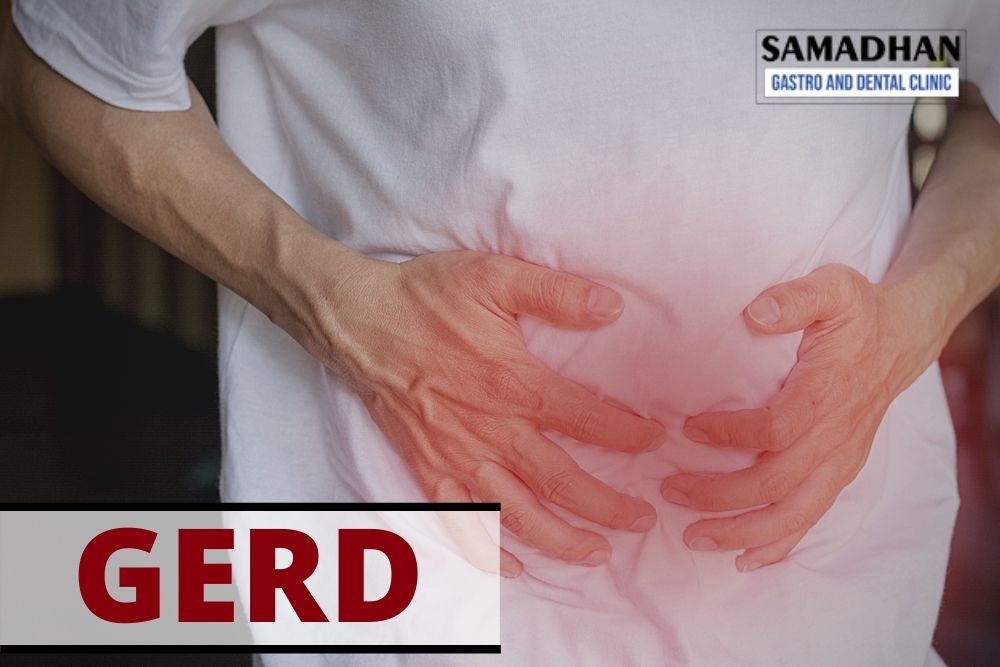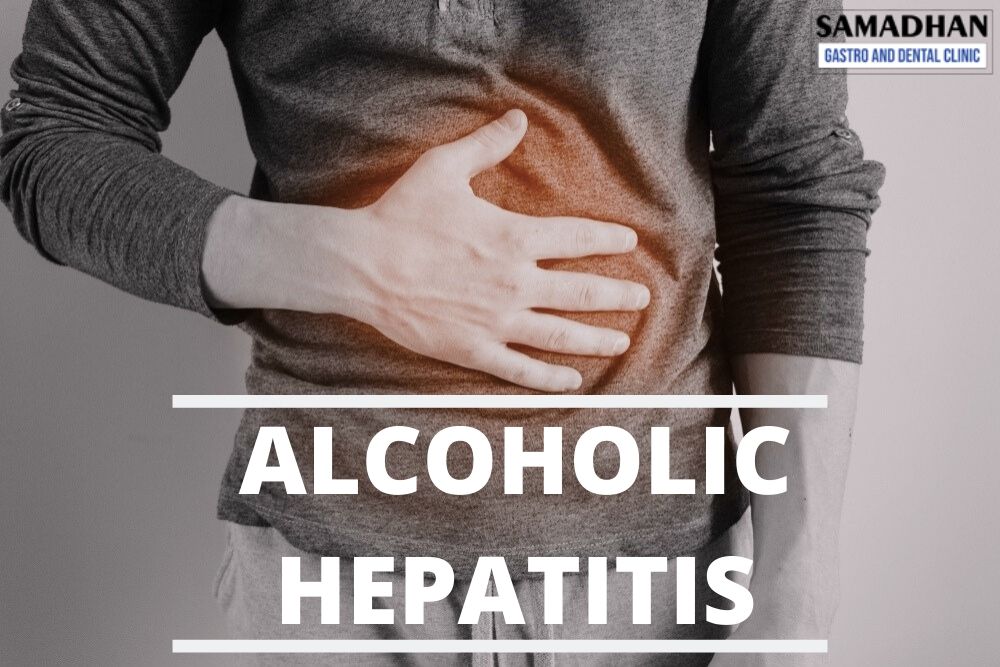Gerd

Acid reflux happens when the valve that connects the stomach to the esophagus weakens. Due to this, stomach acid flows back into the food pipe. The stomach acid is irritant in nature and the lining of the esophagus becomes inflamed. The patient gets a feeling of hot, acidic fluid at the back of his/her throat that can cause huge discomfort. The person can also have chest pain while lying down especially immediately after eating. If acid reflux symptoms happen frequently (more than twice a week) it can cause acid reflux disease commonly known as gastroesophageal reflux disease (GERD).
Gerd Symptoms
The main symptom of acid reflux is heartburn. It may be caused due to excessive eating, overweight or eating fatty foods. There may be many other symptoms of acid reflux. They include:
Heartburn: It is a burning pain that moves up to the chest or throat from the stomach.
Burping
Bloating
Regurgitation: a sour acid backing up into the mouth.
Bloody Vomiting
Nausea
Dry cough
Sore throat
Black Stools
Hiccups
Dysphagia
Gerd Causes
The cause of GERD is frequent acid reflux. The frequent backwash of acid causes huge discomfort. However, certain conditions increase the risk of GERD. They include:
Pregnancy
Obesity
Scleroderma
Delayed stomach emptying
Risk factors (GERD)
GERD, termed Gastroesophageal Reflux Disease, affects many people and is called acid reflux or heartburn. GERD can develop in anyone of any age group with unknown causes. A person’s risk of developing GERD increases as they age, as people more than 50 years old may be at the highest risk. There are many risk factors for GERD, some of which a person may be out of a person’s control, and some people may be able to change. There are many risk factors linked with GERD that make a person more prone:
- Being overweight
Being overweight or obese increases your chances of developing GERD because of an additional weight, causing pressure on the stomach. It leads to acid in the stomach and makes content travel back up your esophagus. You need to maintain a healthy weight as it will help you to reduce the pressure on the stomach and reduce GERD and heartburn symptoms.
- Pregnancy
Pregnant women are at more risk of developing GERD due to bodily changes and increased heartburn symptoms. The increased weight and fetus growth create pressure on the stomach that causes stomach contents and acid reflux into the esophagus. Pregnancy hormones cause the lower esophagus to weaken, allowing stomach acids to push quickly.
- Exposure to cigarette smoke lifestyle factors
Smokers, past smokers, and people exposed to passive smoke are more prone to GERD. Drinking coffee or alcohol causes GERD symptoms, and eating large meals late at night can also make a person more prone to it.
- Medications
Certain medications and supplements also make a person more prone to develop GERD because it relaxes the lower esophagus and causes inflammation.
- Other diseases
Many other diseases or conditions put you at more risk of developing GERD, including diabetes, asthma, connective tissue disorders, etc.
- Hiatal Hernia
It is a condition in which the upper part of a person’s stomach moves up into the chest.
- Gastroparesis
It is a condition in which a person’s stomach takes time to empty, and delayed time can increase the risk of GERD due to food being in the stomach for longer.
- Dietary risk factors
Eating fatty, fried, and spicy foods makes a person more at risk of developing GERD. Also, sometimes drinking carbonated drinks can also increase your chances.
Complications of GERD
Acid reflux mainly affects your esophagus, though it can sometimes get into your windpipe or airways. If the treatment of acid reflux is delayed, the condition may result in severe complications if chronic acid reflux persists. Some complications linked are :
- Esophagitis
It is a complication that can develop because of too much stomach acid, due to which the esophagus becomes inflamed. The condition may cause esophageal ulcers in which sores and ulcers develop, and they can lead to pain and also create difficulty in swallowing.
- Esophagus stricture
In this condition, scar tissue develops in the lining of the esophagus because of the damage to the cells in the lower esophagus. It is due to the constant exposure to stomach acids and scar tissue that narrows the wall of the esophagus, which leads to difficulty in swallowing.
- Barrette’s esophagus and esophagus cancer
The condition develops when normal tissue is abnormally replaced with different tissues that are the same as the tissue lining. If not treated on time, the condition may increase your risk of developing esophageal cancer.
- Shortness of breath
Also known as Dyspnea, the condition develops in which you feel that you cannot get enough air into the lungs. GERD can also be an underlying cause of asthma and overbreathing problems.
- Aspiration pneumonia
The condition can be caused by inhaling the stomach acid that rises into the throat and infects the lungs. The condition develops when a person breathes something other than air in the respiratory tract.
Gerd Treatment
Over The Counter Medications
Medications like antacids, H-2 receptor blockers, proton pump inhibitors, etc. are available that provide respite from GERD.
Antacids
Antacids that neutralize stomach acid can provide quick respite.Medicines that aid in reducing acid production include H2 receptor blockers (cimetidine, nizatidine, and ranitidine), proton pump inhibitors (Omeprazole, Pantoprazole, Lansoprazole, Rabeprazole, Esmoprazole).
Surgery
Surgery is an effective way to treat GERD. The surgery is:
Fundoplication
The stomach is wrapped around the Lower Esophageal Sphincter (LES) to tighten the muscle and prevent reflux.Surgery is advisable to those who do not wish to take medicines regularly and in those whom regurgitation is troublesome despite medicines
Stop Smoking
Smoking is strictly prohibited as it weakens the Lower Esophageal Sphincter (LES) which in turn increases the reflux of stomach acid.
Say No to Alcohol
Similar to smoking, consumption of alcohol is also a strict no. It also weakens the Lower Esophageal Sphincter (LES) and increases the chances of reflux of acid.
Avoid foods that cause reflux
Fatty or fried foods like garlic, onion, ketchup, caffeine, tomato mint, etc should be avoided as they cause acid reflux.
Overeating should be avoided
Eating big and heavy meals causes acid reflux. So try avoiding them. Also, make sure you are chewing every bite of your food properly. Take your time after every bite and before your next bite.
Maintain a stable weight
Maintaining a healthy weight puts very less or no pressure on the abdomen. This prevents the stomach from pushing the acid and causing it to reflux into your food pipe.
Do not lie down immediately after a meal
Maintaining a healthy weight puts very less or no pressure on the abdomen. This prevents the stomach from pushing the acid and causing it to reflux into your food pipe.
Say no to tight-fitting clothes
Do not wear clothes that fit tightly around your waist as they put pressure on the abdomen and the lower esophageal sphincter.
Raise the level of the head of your bed
Try to raise the head end of your bed 5 to 6 inches to elevate your body from the waist up. Remember just raising the head of your body is not enough, you should raise the level of the bed for the best results.
Do not sleep on your right side
Sleeping on your right side may worsen reflux symptoms at night. Try resting on your left side as it will make you more comfortable.
Samadhan Clinic has the best gastroenterologist in Delhi for the treatment of GERD. Dr. Shri Ram Agarwal who has +20years experience as the gastroenterologist in Delhi treated many of the patient who has GERD problem.
FAQ
1. What is the main cause of GERD?
Occasional acid reflux is normal, but recurrent acid reflux or GERD is a matter of concern and has many causes.
- Obese or overweight people are more prone to GERD
- If you are pregnant, you can have recurrent GERD
- If you are taking medications comprising asthma, calcium, sedatives, etc
- If you smoke or are more into secondhand smoke.
- If you have a Hiatal Hernia.
- If you frequently eat large meals or lie down soon after heavy meals.
2. What are the three symptoms of GERD?
GERD Symptoms more than two times a week, along with inflammation in the esophagus, are considered moderate or severe GERD. Symptoms that worsen after heavy meals include immediately eating, bending, or lying down. It’s vital to pay attention to GERD symptoms as gastric juices of the stomach are very powerful. Some common symptoms of GERD are
- Heartburn or a burning feeling in your stomach
- Sour or bitter taste in the mouth and a feeling of fullness
- Lump in the back of your throat or cough and bad breath.
3. How do you get GERD to go away?
GERD is a severe condition that should be treated well, as it will not go away on its own. Treatment of GERD mainly focuses on decreasing reflux amount or reducing damage to the lining of the esophagus from refluxed materials. Your doctor may prescribe you some over-the-counter or prescription medications to treat your symptoms. You must
- Avoid heavy meals
- Eat smaller servings and slowly
- Stop smoking
- Maintain a healthy weight

